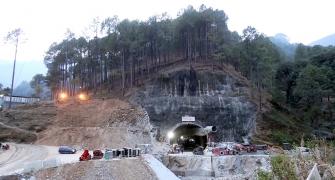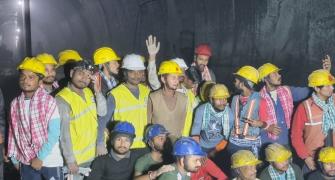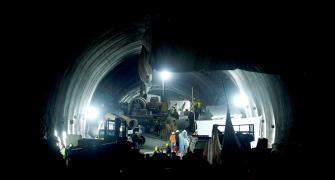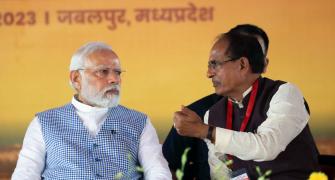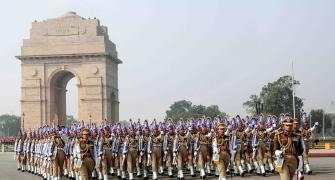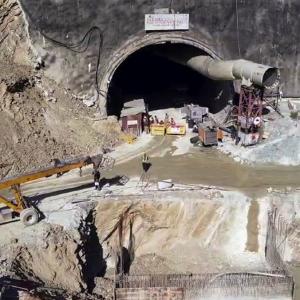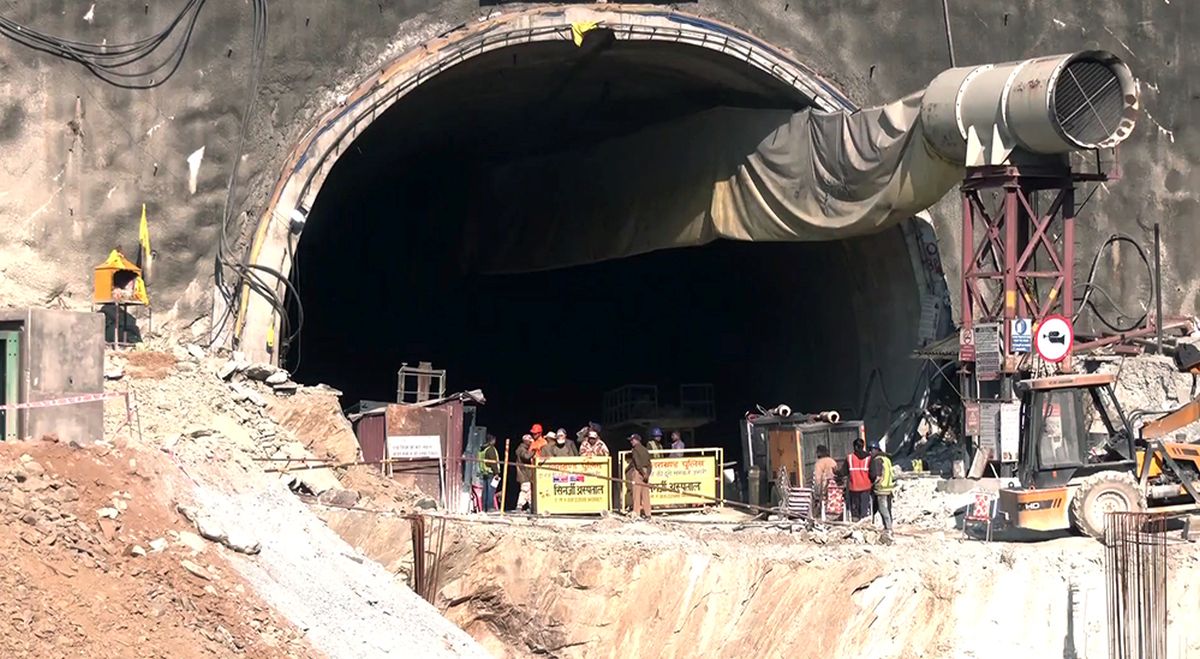'I would put my hand in the ground and have a little listen to what the mountain was doing.'
'Actually, it was still collapsing.'
'And there was a very real possibility that at some stage, without warning, the collapse could continue -- and continue across us, the people who were doing the rescue and also across to the men on the other side, who were being rescued.'

Tunnelling professional Professor Arnold Edward Dix, 59, has just returned from his daughter's school in Monbulk, a farming town in the shadow of the Dandenong mountains, 42 km from Melbourne, in Victoria, Australia, where he spent about an hour recounting a Christmas story to her classmates.
It was a true Christmas story. Not an imaginary one.
His tale had nothing to do with grinches, nutcrackers, carols, a Polar Express, sugarplums or snowmen.
It was a story of hope. A tale that showed "We all might be different people, but in the end we all just want the best for our kids."
A story with the message that "Good People can do Kind Things, Great Things."
Cheerful Dix, who looks and sounds a bit like a twinkle-eyed Santa himself, recounted a miraculous Christmas story about the wonderful rescue of 41 young men in Uttarakhand's Silkyara tunnel, without any loss of life, that illustrated, according to him, how we are all little people contending with the "big forces" out there, but we just have to stay positive, work together to find solutions.
Like all tales with a universal message, it found instant resonance in faraway Australia and the children loved it. They cheered and clapped at the end of it.
Ever since Dix got involved as a volunteer with the nail-biting Himalayan tunnel rescue, he, along with the rat miners Feroz, Munna, Rashid, Irshad, Naseem, Monu, Naseer, Ankur, Jatin, Devender, Saurabh, Waqeel, Hasan, have become international stars. He returned to a hero's welcome in Australia, with the country's prime minister, Anthony Albanese taking time out in parliament to celebrate him. He has been feted and interviewed wherever he went.
The underground expert collected a tonne of Indian hearts when he was spied, tikka on his forehead, praying at a mountain shrine of Baba Boukhnag, heartily tucking into Indian vegetarian food and gamely and readily immersing himself, even spiritually, in our culture.
Dix is quick to confess that the time he spent in Silkyara in the depth of the majestic, mysterious Himalayas was a soul-altering experience for him, where he learnt different, eccentric styles of problem solving, an alternative flabbergasting culture of management and about a kind of resilience, kindness and concern for human life he had not encountered before, that touched him deeply.
A geologist and legal expert, who earned both his degrees at Monash University, Clayton, Australia, with various visiting professorships, Dix belongs to a not very large community of specialists in tunnelling, with his key area being troubleshooting and helping governments and he is the president of the Geneva-based International Tunnelling and Underground Space Association.
"I've never been in the midst of a process where it felt like India, as a country, all its agencies, the military and everything, had all got together and said, 'We're going to save the lives of these 41 men'. That was quite an experience," he tells Rediff.com's Vaihayasi Pande Daniel in the first of a multi-part, exclusive, interview.
What was it like coming to India and helping with this rescue? It made you quite a star. How has the entire experience changed you? What was your takeaway?
Oh, that's an interesting (question). I found the whole experience almost enlightening. I know, it sounds a bit odd. I was really struck by the sophistication and maturity of the Indian sense of justice and fairness and of the value of a human life.
I don't know if I'd really fully appreciated that before. I'd certainly seen how you shouldn't jump on ants or kill things and what have you. But I've never been in the midst of a process where it felt like India, as a country, all its agencies, the military and everything, had all got together and said, 'We're going to save the lives of these 41 men'. That was quite an experience. It's unlike what I find in many countries, when people are in trouble.
They're not superstars. They're not Bollywood stars. They're not super-rich people. They're just like normal, hardworking people. And yet, the whole country just rallied around and (said) 'We're going to bring these kids home'.
I really liked that. I found that a very high form of civilisation, a high form of humanity. I enjoyed being part of it.

I understand it was quite a journey for you to get to the site of the tunnel collapse?
Diwali started for me in New Zealand. I had the first call, after the incident, when I was in New Zealand. Then I got called when I was in Germany. I had something to do there. It was a bit urgent. Finally, when things weren't going so well, I was in Ljubljana, Slovenia. That's when the secretary and the chief engineer (India's ministry of road transport and highways) said to me, 'Look, can you get here?'
Actually, it was quite hard to get there. I was in a kind of a remote part of Europe. You wouldn't think Europe has a remote part. It was like: 'Oh, yeah, we don't have a plane going today. But we've got one tomorrow' and then I had to get connections from Slovenia to the Middle East and a plane from the Middle East to, I think, Mumbai, from Mumbai, I had to get to Delhi and then from Delhi to Dehradun. From there, it was pretty easy because there was a helicopter. That was pretty cool.
You arrived at the site on November 19 by helicopter?
Yeeeaah! Which was fantastic. Because my name is Arnold. This was like what Arnold Schwarzenegger does in one of those movies. I got no muscles. I got no guns, but it was awesome to actually come into the Himalayas on, I think, a military helicopter. That was pretty much like a once-in-a-lifetime thing.

Who was the person who contacted you first?
The first person to contact me was India's chief engineer, Mr Gupta (Rahul Gupta, Chief Engineer, MoRTH, New Delhi). We just discussed strategies in the beginning. And then the next (conversations) were with him and the secretary of the whole federal department (Anurag Jain).
The secretary then asked me to come. I said, 'Yes, of course'. It was as uncomplicated as that. He had an emergency, and we just kind of help each other like 'You're my friends'. It could have been my kids (Australian underground workers) who were stuck in there, because my kids also work in tunneling. I was like, 'Of course, I will come'. Of course, I just came as quick as I could.

Did you get to know the 41 men after they were pulled out?
It was a funny thing. Yes and no. A little bit.
So, what happened was I was meant to, in fact, I was told immediately after they were pulled out (on November 28, 17 days later), I was to go to a helipad and get flown back to Delhi.
I just felt that I had unfinished business. I kind of didn't do what I was told. Not kind of. I didn't do what I was told. And I snuck off with the SDRF rescue men (State Disaster Response Force). I was to be at the helipad. But actually, I ran off and went up the mountain where the main temple is for the god for that particular mountain.
I had the best day but unfortunately, I made a lot of people a bit annoyed with me because a helicopter was waiting, and I never came. I thought I'd told them, but apparently my message didn't get through. They were a bit worried that maybe I'd fallen off a cliff or any of all the sorts of things that happen when you're in the Himalayas.
The good news about all of that was: Even though I missed my helicopter, even though I had a great day up the mountain, even though that meant I couldn't get a helicopter so I had to get a car, even though that then delayed me another day, even though I missed my flight... But the flight that I did get had a whole heap of the men I rescued on it!
They were on the flight with me, and we were all seated together. Actually, I had the best time. We all introduced ourselves to each other. And it was a really wonderful experience. It was obviously just meant to be.
The funniest thing was the airline had put them in the exit rows. I thought that was really funny, next to the little door on the airplane. They'd never been on a plane before. When the airline hostess comes down to tell us like, 'Are we prepared to use the doors in an emergency?' I just start laughing.
Like, I was telling the air hostess, 'Don't you know who these guys are? These guys have just burrowed out of a Himalayan mountain through a million tonnes of rock. You can assume that they're going to be able to open a little door onto the wing'.
But the airline lady, she's getting angry with me. It doesn't matter how many times she tells me to shut up, I just keep on laughing at her and thinking it's very, very, funny.
Anyway, so eventually I had to behave myself. Eventually they agreed that they would use the emergency door if in the unlikely event of an accident, blah blah blah. We said farewell in Delhi, and sort of wished each other goodbye.
It was wonderful. It was a really charming and fitting end to an epic -- an epic rescue of almost god-like proportions. I couldn't have couldn't have written the story better than this reality. It was just fantastic.
WATCH: Arnold Dix with members of the Silkyara rescue team
The Australian prime minister was talking about how you went into the Uttarakhand tunnel and your wife was very scared that you might get trapped inside. What was it like on a day-to-day basis inside there?
Well, it's a mountain. It's collapsing. So, we had the initial collapse. Speaking as an engineer now, and as a tunnel expert, it was quite clear from all the data that we were getting -- data from drone-based LIDAR surveys, from satellite LIDAR surveys, from traditional on-the-ground surveys -- that everything was still moving.
We increasingly had data from the site, where the men were trapped, showing us that the roof was collapsing, particularly on the left side. So, we had collapse occurring on the left side, on the side the men were trapped. Plus, we had what looked like the early stages of collapse on the side that we were rescuing.
I would always go right down to the avalanche, and literally put my hand in the ground, and just sit there and have a little listen to what the mountain was doing.
Actually, it was still collapsing. And there was a very real possibility that at some stage, without warning, the collapse could continue -- and continue across us, the people who were doing the rescue and also across to the men on the other side, who were being rescued.
It was very much a high-alert thing. You go in there. But you're listening to the rocks. You're listening to the sound of the cracks. You're watching for things falling from the roof. You're watching for rocks coming from where the avalanche had been.
The good thing was that the best experts in the world were there -- like the Himalayan experts from India are just fantastic. And they come from the federal agencies, the state agencies, the army, the Indian coal agency, so many areas. Between us all, I think we were able to come to quite an informed view about the likelihood of it collapsing while we were there.
Although we knew it was still collapsing, and we knew that there was a chance it was going to collapse at any moment, we were just on super high alert, because we knew we also had a rescue to complete.
It was quite a balancing act. But an informed balancing act. Not a crazy balancing act. But we were going to do this, we were going to be calm, we were caring about our own well-being, we were making sure that people on the other side were going to be rescued.
We were not going to jeopardise that, we were not going to cause another avalanche by doing something crazy. It was a quite informed and careful balancing act that we were performing.
- Part 2 of the Interview: 'Things are done in India that look chaotic. But it's not chaotic at all'
Feature Presentation: Aslam Hunani/Rediff.com

